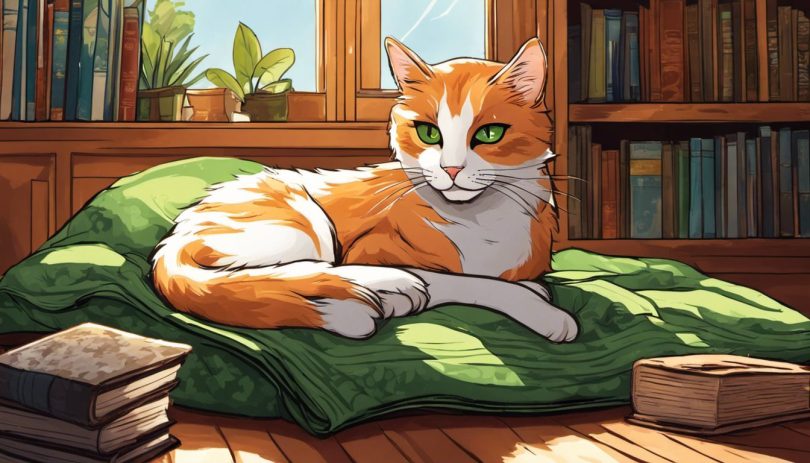Ever found yourself taken aback by your cat’s impressively loud purring, to the point where it makes you wonder what on earth could be causing such a ruckus? Believe me, I can relate! As an avid cat lover myself, my curiosity has led me down some interesting paths trying to solve this noisy conundrum.
From diving into scientific research to analyzing feline behavior patterns, I’ve gathered quite a wealth of knowledge in search of answers. In this comprehensive guide, we’re going to explore why our feline companions sometimes sound like they’re prepping for takeoff – how it’s related to their emotions, health status and unique ways they communicate with us.
Are you ready for an intriguing journey into the world of uproarious purring? Let’s pounce right in!
Key Takeaways
- Cats purr because of special vocal cords in their throats that vibrate rapidly, creating the unique sound.
- Loud purring can indicate various emotional states such as contentment or stress.
- Excessive or unusually loud purring may be a sign of underlying medical conditions.
- Creating a comfortable environment, providing playtime and exercise, and offering a healthy diet can help reduce stress in cats.
What is Purring?
Purring is a unique vocalization that cats produce by rapidly vibrating their laryngeal muscles, creating a soothing and rhythmic sound.
What causes purring?
Cats purr because of a special set of vocal cords they have, deep inside their throats. Upon receiving signals from the brain, these vocal cords act like valves that open and close rapidly as the cat breathes in and out. This rapid movement creates the unique vibrating sound we know as purring. It’s fascinating how this simple biological process can produce such an extraordinary sound!
Moreover, various external factors stimulate cats to purr. These can range from being contented while getting stroked or fed, to feeling stressed or anxious about something in their environment. In some cases, loud purring may even indicate certain medical conditions or it might just be a tool for managing pain and promoting healing within their bodies. So next time your furry friend starts to rumble loudly on your lap after a hearty meal or during a play session, remember that there is so much more behind those soothing vibrations than meets the eye!
What does purring mean?
Purring holds an enchanting mystery that cat owners love to unravel. Cats use purring as a sophisticated form of communication, demonstrating more complexity than initially believed. It’s not just a simple hum or vibration; it’s a powerful tool for interacting with their humans and fellow felines.
Various studies suggest that cats purr to communicate diverse emotional states ranging from contentedness and calmness to nervousness and stress management. At times, the intensity of your furry friend’s purr can be perceived as loud because they are seeking attention or dealing with some underlying medical conditions.
Some breeds like Maine Coons, Sphynx, Burmese, and Siamese are naturally louder at purring due to genetic traits.
Interestingly enough, cats also utilize this unique mechanism as part of pain management or even promoting healing in their bodies. But let’s not forget – despite all these fascinating facts about cat purring behavior – the exact reason why cats continue this rhythmic sound remains partially veiled in mystery!
Reasons for a Cat’s Loud Purring
Cat’s loud purring can be caused by various reasons such as attention seeking, stress and anxiety, medical conditions, and signs of contentment.
Attention Seeking
I can’t ignore the fact that cats are social creatures. Sometimes, their loud purring serves as a way to get our attention. It’s no secret that they use this communication tool skillfully when they want something from us, like food or playtime.
Ever noticed how your cat may start purring louder when it’s supper time? This is not by accident. They know we’ll hear them and respond accordingly. However, you must be careful not to reinforce excessive loud purring for attention all the time, so it doesn’t become a persistent behavior.
Stress and Anxiety
Stress and anxiety can also contribute to a cat’s loud purring. Cats, like humans, can experience stress from various sources, such as changes in their environment, lack of interaction or attention, or even the presence of other animals.
When cats feel stressed or anxious, they may use purring as a way to self-soothe and calm themselves down.
Purring acts as a sort of feline therapy for stress relief. It releases endorphins that help reduce feelings of anxiety and promote relaxation. So if your cat’s purr seems louder than usual, it could be their way of coping with stressful situations.
To help alleviate stress in your cat, creating a comfortable and safe environment is important. Providing plenty of hiding spots and vertical spaces for them to climb can give them a sense of security.
Additionally, engaging in playtime and exercise with your cat on a regular basis can help reduce stress levels by promoting physical activity and mental stimulation. A healthy diet is also crucial to ensure your cat’s overall well-being and minimize any underlying health issues that could lead to increased anxiety levels.
Medical Conditions
Medical conditions can be a cause of loud purring in cats. Sometimes, excessive or unusually loud purring can indicate that your feline friend is not feeling well. Certain medical conditions, such as respiratory issues or pain, can lead to louder-than-normal purring.
If you notice a sudden change in your cat’s purr volume accompanied by other signs like lethargy, loss of appetite, or difficulty breathing, it may be wise to consult with a veterinarian to rule out any underlying health concerns.
In addition to respiratory problems and pain management issues, other medical conditions like hyperthyroidism or dental disease can also contribute to louder purring in cats. It’s important for pet owners to stay alert and pay attention to changes in their cat’s behavior and vocalizations.
Signs of Contentment
Cats are social creatures, and when they feel content, their purrs become a telltale sign. A cat’s loud purring can be an indication that they are in a state of bliss. When your feline friend is relaxed and happy, their purr may become louder than usual.
This is their way of expressing satisfaction and comfort with their surroundings and the people around them. So if you hear your cat purring loudly while curled up in your lap or lounging on their favorite spot, it’s a clear sign that they are content.
Another indicator of contentment in cats is their body language. When cats are happy and at ease, they often exhibit relaxed postures like lying on their back or stretching out completely.
Their eyes may appear half-closed or slightly squinted, indicating a sense of peacefulness. Additionally, content cats often engage in grooming behaviors such as licking themselves or other cats nearby, which helps to build bonds within the feline community.
Ways to Reduce Stress in Cats
To help reduce stress in cats, create a cozy and comfortable environment for them. Provide plenty of playtime and exercise to keep them active and engaged. Offer a healthy diet that meets their nutritional needs.
Consider using calming products like pheromone sprays or diffusers. And if you’re concerned about your cat’s stress levels, don’t hesitate to consult with a veterinarian for expert advice.
Find out more on how to keep your furry friend calm and contented!
Create a Comfortable Environment
Creating a comfortable environment for your cat is essential to their well-being and can help reduce stress levels. Start by providing them with a cozy and safe space where they feel secure.
This could be a designated area in your home, such as a quiet corner or a separate room with their bed, litter box, and toys. Ensure that the temperature is comfortable, as cats can be sensitive to extreme heat or cold.
In addition to creating a physical environment, consider the emotional atmosphere too. Provide plenty of hiding spots and vertical spaces like cat trees or shelves for climbing, which can make them feel more secure.
Make sure they have access to natural light and windows so they can observe the outside world.
Another crucial aspect of creating comfort is maintaining consistent routines. Cats thrive on predictability; establish regular feeding times, play sessions, and grooming rituals. This will give your cat a sense of security and stability in their daily life.
Playtime and Exercise
Playtime and exercise are essential for your cat’s overall well-being. Not only does it provide physical stimulation, but it also helps them release pent-up energy and prevent boredom.
Regular play sessions can help reduce stress, anxiety, and aggressive behavior in cats. Engaging in interactive play with toys or using a laser pointer can simulate hunting instincts and keep your feline friend entertained.
It’s important to remember that each cat has different activity levels and preferences, so find what works best for your furry companion. Some cats enjoy chasing feather wands or batting at toy mice, while others may prefer puzzle toys that challenge their problem-solving abilities.
Incorporating variety into their playtime routine will keep them mentally stimulated.
Healthy Diet
Feeding your cat a healthy diet is essential for their overall well-being and can also have an impact on the volume of their purring. Providing a balanced and nutritious diet helps to keep your furry friend in good health, which can reduce stress and promote contentment.
Cats need a diet that is high in protein and low in carbohydrates, similar to what they would eat in the wild. Look for cat food with real meat as the first ingredient, as this will provide them with the nutrients they need to thrive.
In addition to choosing the right food, it’s important to feed your cat the proper portion sizes. Obesity can lead to various health problems and may affect how loudly your cat purrs.
Follow feeding guidelines provided by your veterinarian or pet food manufacturer to ensure you’re giving them the correct amount.
Remember that water is just as important as food when it comes to maintaining a healthy diet for cats. Make sure they always have access to fresh, clean water throughout the day.
Calming Products
Calming products can be beneficial in reducing stress and anxiety in cats. There are a variety of options available, such as pheromone diffusers, calming sprays, and herbal remedies.
These products work by releasing substances that mimic the natural pheromones produced by mother cats to soothe their kittens. By creating a familiar and safe environment, calming products can help alleviate nervousness and promote relaxation. When choosing calming products for your cat, it’s important to consult with your veterinarian to ensure they are safe and appropriate for your pet. The vet can recommend specific brands or formulations that have been proven effective.
It’s also essential to follow the manufacturer’s instructions carefully when using these products. In addition to using calming products, other strategies like creating a comfortable environment, engaging in regular playtime and exercise with your cat, providing a healthy diet, and seeking professional advice from a veterinarian can all contribute to reducing stress levels in your feline friend.
Consult with a Veterinarian
If your cat’s purring has suddenly become unusually loud, it may be a cause for concern. A consultation with a veterinarian can help determine if there is an underlying medical condition contributing to the excessive purring.
Loud purring in cats can sometimes indicate sickness or discomfort, so it’s important to have your fur baby thoroughly examined by a professional. A veterinarian will be able to assess their overall health and conduct any necessary tests or procedures to diagnose and treat any potential issues. – Remember, seeking professional advice is crucial in ensuring the well-being of your beloved feline friend.
Conclusion
The mystery behind why our cats’ purrs are so loud continues to captivate us. From communication to contentment, their purring serves a variety of purposes. Understanding the reasons behind their loud purring can help us better care for our feline friends and ensure their well-being.
So next time your cat’s purr fills the room, listen closely and appreciate the unique way they express themselves.
FAQs
1. Why is my cat’s purr so loud?
Your cat’s purr may be loud due to various reasons such as the size and shape of their vocal cords, their excitement or contentment level, or even a medical condition that causes increased vibration.
2. Is a loud purr normal for cats?
Yes, a loud purr can be perfectly normal for cats and is often an indication of their happiness and relaxation.
3. Can a cat’s loud purring indicate something is wrong?
While most of the time a loud purring indicates contentment, there are instances where it could signal pain or discomfort. It’s important to observe your cat’s behavior and overall health for any additional signs of distress.
4. How can I make my cat’s purr quieter?
You cannot make your cat’s natural purring sound quieter as it is part of their genetic makeup. However, if you find it bothersome during sleep or relaxation times, providing them with a separate space might help reduce noise disturbances.
5. Are certain breeds more prone to having louder purrs?
Some breeds like the Maine Coon or British Shorthair are known to have deeper and louder purrs compared to others due to their specific physical characteristics.





